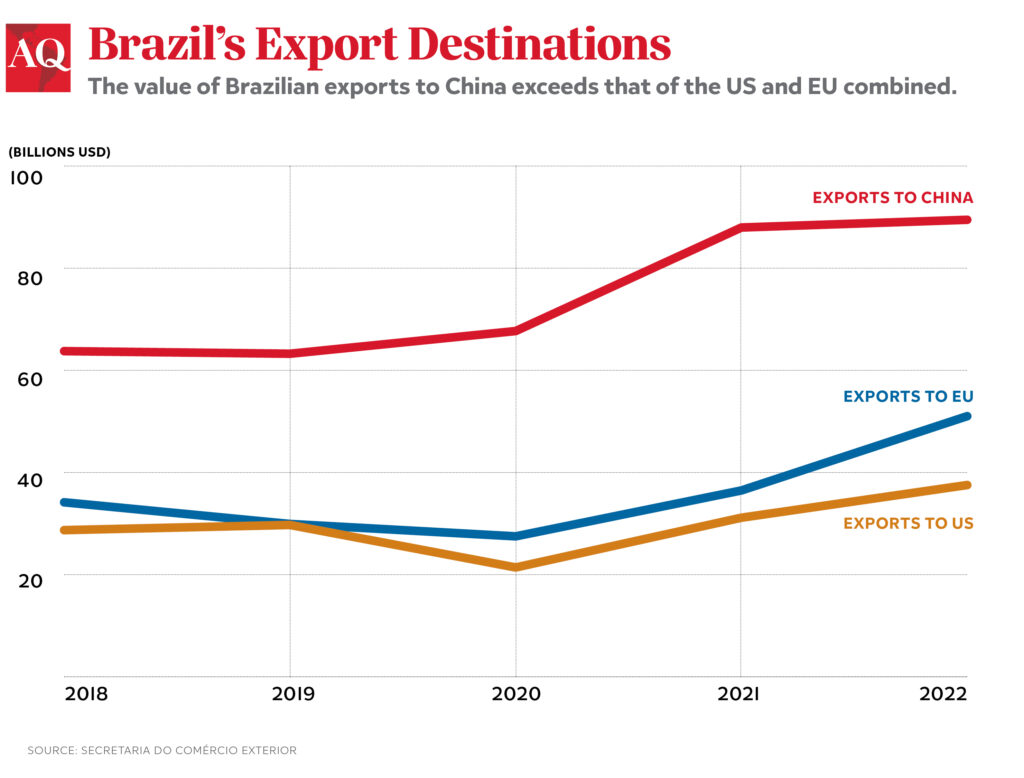SÃO PAULO — China knows a thing or two about rolling out the red carpet and offering lavish treatment to foreign visitors. And it will be no different when Xi Jinping hosts Brazil’s President Luiz Inácio Lula da Silva on Friday, which marks his third state visit to Beijing. After Lula was forced to cancel a planned trip due to illness in March, Chinese officials quickly signaled they’d be willing to reschedule as soon as possible, underlining that the state visit is a priority for Xi.
While the visit is primarily about deepening economic ties even further—China has been Brazil’s biggest trade partner since 2009—the Chinese government’s not-so-subtle message is that ties to the Middle Kingdom are far more rewarding—and problem-free—than Brazil’s relationship to the United States. As a recent op-ed in China Daily, a Communist Party-owned English-language newspaper pointed out, Lula’s meeting with U.S. President Joe Biden “didn’t produce any substantive results,” while the Brazilian president’s upcoming state visit to China promised vast potential to deepen “win-win” cooperation.

Arguing that Lula’s state visit to Beijing produced more meaningful results that the recent Lula-Biden meeting in Washington will be relatively easy: after all, Lula’s trip to the United States in early February was mostly symbolic and saw Brazil’s president thanking his U.S. counterpart for helping defend Brazilian democracy during recent turbulence in Brazil. Despite the bonhomie, the visit was ultimately frustrating for both sides due to a failure to confirm how much the U.S. would provide to fight deforestation in the Amazon and its skepticism about Brazil’s call for peace and to end the Ukraine war.
The Brazilian government has no reason to undermine Beijing’s narrative about the Lula visit: after all, a pompous reception in China will help the country signal to the United States that it has other options. The stronger its ties to the Middle Kingdom, the Lula government reasons, the greater Brazil’s leverage as it engages the historically asymmetric relationship to the United States. It is not only in Washington where China’s growing role in Latin America is keenly watched. In Europe, too, Lula’s trip will be used by supporters of the EU-Mercosur trade deal as an argument that the European Union must quickly lock in the agreement to put an end to the bloc’s declining political influence in the region.
Yet while geopolitics plays some role, Lula’s big bet on China is mostly about domestic politics and economic considerations. Normalizing and strengthening ties to Beijing is a unique opportunity for Brazil’s leftist president to build a rapport with agribusiness leaders, the vast majority of whom have been staunch supporters of Bolsonaro—despite many in the sector also getting jittery whenever the former president would lash out against Asia’s largest economy. There are few better ways for Lula to project himself as “business friendly” than deepening trade ties to China and working towards attracting more direct investments from the country. Lula faces an increasingly somber economic scenario and a growing consensus that things will get worse before they get better, perhaps at some point next year. That perspective explains why Lula is keen to produce good news on the economic front as soon as possible, even if Brazil’s potential decision to join the China’s Belt and Road Initiative would be mostly to create a narrative about already existing investments or previously agreed-upon investment decisions.
Still, President Lula can expect to bag a number of high-profile Chinese investment promises that the government will use to substantiate its “Brazil is back” narrative. For example, car maker BYD could revive a factory in Bahia state that was once a Ford facility. Greater cooperation is also already in the works in areas such as trade facilitation (e.g. through digital certification and direct clearing between their respective currencies, Brazilian real and the Chinese yuan), development of satellites to monitor the rainforest, infrastructure for 5G and 6G technology as well as sales of Embraer jets to Chinese airlines—which will no doubt help endear Lula to friend and foe alike on the domestic front.
While the Brazilian president’s ambition to help bring peace to Ukraine may generate some controversy, geopolitics hardly ever affects Brazilians’ approval ratings at home. Yet a growing number of analysts fear that Brazil’s activism vis-à-vis the war may negatively affect the country’s reputation in Europe and the United States, where concerns are growing that Lula contributes to legitimizing Russia’s narrative that the West is supposedly not interested in negotiating a peace agreement. Announcing a peace plan while in Beijing—a staunch ally of Moscow—would certainly consolidate this perception.
Still, on the international stage, Lula remains the guest everyone wants at the party: After Beijing, the president has a stopover in the Emirates—where he hopes to announce more investments—and in just a few weeks, Lula has trips planned to Portugal, Spain as well as an invitation to attend the G7 Summit in May.








